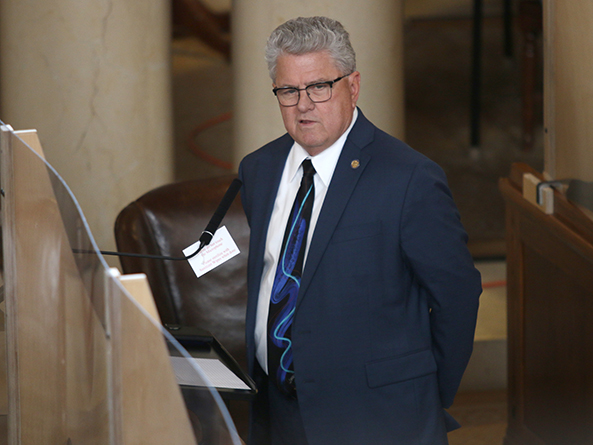Session Review: Retirement Systems
Lawmakers overcame a gubernatorial veto to authorize a state takeover of management duties for the Omaha school retirement plan this session.
LB147, sponsored by Seward Sen. Mark Kolterman, transfers duties and responsibilities for management of the OPS plan from the Omaha School Employees Retirement System board of trustees to the Public Employees Retirement Board, which manages the rest of the state’s plans through the Nebraska Public Employees Retirement Systems.
The transfer will take effect Sept. 1, 2024. The school district, board of education, board of trustees and the PERB must finalize a transfer of management agreement by Dec. 31, 2021.
The bill specifies that the school district remains liable for the retirement system’s funding obligations and OPS will cover all costs for the management transfer.
The measure includes components of three additional bills related to the transfer, all sponsored by Kolterman.
Provisions of LB145 require completion of a compliance audit of the Omaha pension plan by Nov. 15, 2021, and the first annual audit by the state auditor by July 1, 2022.
Provisions of LB582 terminate the board of trustees’ authority to administer the plan on July 1, 2021, and place plan administration authority with the OPS board of education. On that date, new members of the board of trustees, appointed by the board of education, will begin serving their terms. This board of trustees will facilitate the transfer of management to the PERB on Sept. 1, 2024.
Finally, provisions of LB146 expand allowable substitute service up to eight days each calendar month during the 180-day period following a member’s retirement from the school or Omaha plan. The IRS requires limitations on service during this period to ensure that a bona fide separation of service has occurred.
OPS allows temporary service after a 30-day waiting period following termination if it is to accomplish a specific purpose or task, not to exceed one year.
LB147 passed on a 38-3 vote and took effect immediately. The bill subsequently was vetoed by Gov. Pete Ricketts, who called it a “slippery slope” toward the state eventually assuming responsibility for the troubled retirement plan’s nearly $1 billion unfunded liability.
Kolterman offered a motion to override the veto, noting that the bill contains an explicit provision that OPS remains “at all times and in all circumstances” solely liable for all the plan’s funding obligations. Senators voted 31-18 to override the governor’s veto. Thirty votes were needed.
Lawmakers also approved LB17, introduced by Kolterman, which adopts shorter amortization periods to reflect current actuarial standards for the judges’, state patrol and school employee retirement plans. Beginning July 1, 2021, new amortization bases will be based on 25-year periods rather than the current 30-year amortization period.
The bill includes provisions of Kolterman’s LB24 that increase various dedicated court fees to provide additional revenue to cover a shortfall in the judges’ retirement plan. Several fees will increase from $6 to $8 on July 1, 2021, and rise incrementally until reaching $12 on July 1, 2025.
The bill does not increase fees on any criminal cause of action, traffic misdemeanor or infraction, or city or village criminal ordinance violation filed in district court or county court.
LB17 also includes amended provisions of LB16, sponsored by Kolterman, that add an annual contribution from the state to the judges’ retirement fund of 5 percent of total compensation of the members of the judges’ retirement system beginning July 1, 2023. The rate may be adjusted or terminated but cannot rise above 5 percent.
The bill passed on a 33-13 vote and took effect immediately.


